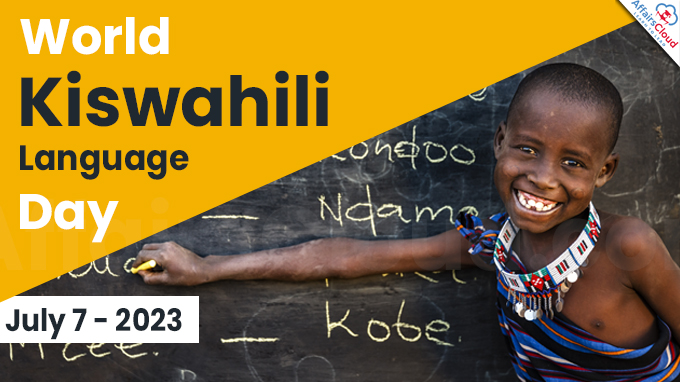
The United Nations Educational, Scientific and Cultural Organization (UNESCO)’s World Kiswahili Language Day is annually celebrated across the globe on 7th July to recognise the role of Kiswahili language as a language of unity.
- The day highlights the role of Kiswahili in promoting cultural diversity, creating awareness and encouraging dialogue among civilizations.
- 7th July 2023 marks the 2nd commemoration of the World Kiswahili Language Day.
The 2023 theme of World Kiswahili Language Day is “Unleashing Kiswahili’s potential in the digital era“, which highlights the important role played by Kiswahili in the digital landscape.
Significance:
The day offers a platform to promote the potential of Kiswahili to achieve the UN 2030 Agenda for Sustainable Development as well as the African Union Agenda 2063.
- Kiswahili, also known as Swahili, is one of the most widely used languages of the African family and the most widely spoken in sub-Saharan Africa.
- It is the only African language within the Directorate of the Global Communications at the UN.
Background:
i. In November 2021, UNESCO in its 41st session of the General Conference adopted the resolution 41 C/61, proclaimed the 7th July of every year as the World Kiswahili Language Day.
ii. The first-ever World Kiswahili Language Day was observed on 7th July 2022.
Note: Kiswahili is the first African language recognized by the UN.
Why July 7th?
On July 7th 1954, the Tanganyika African National Union (TANU) under the Late Mwalimu Julius Kambarage Nyerere, First President of the United Republic of Tanzania, adopted Kiswahili as a unifying language for independence struggles.
About Kiswahili:
i. Kiswahili is among the 10 most widely spoken languages in the world, with more than 200 million speakers.
ii. The language is one of the lingua franca (common language) in many countries within East, Central and Southern Africa as well as in the Middle East.
iii. It is one of the official languages of the African Union (AU), Southern African Development Community (SADC) and East African Community (EAC).
iv. It is an indispensable tool in facilitating regional integration particularly in the implementation of the African Continental Free Trade Agreement (ACFTA).
v. The UN in 1950, established the Kiswahili language unit of UN Radio.
2023 Events:
i. On 7th July 2023, an event was organised on the basis 2023 theme “Unleashing Kiswahili’s potential in the digital era” by the UNESCO and the Permanent Mission of the United Republic of Tanzania, in collaboration with the State Members of the Southern African Development Community (SADC) and East African Community (EAC) to the UN at New York, the United States of America (USA).
ii. This event drew attention to how Kiswahili can act as a bridge, connecting diverse communities and facilitating inclusive participation in the digital world.
Establishing Kiswahili from India:
i. Since May 1943, the external service division of Akashvani, formerly known as All India Radio (AIR), the national public radio broadcaster of India has been broadcasting a daily Kiswahili (Swahili) language service to reach out to the African community all over the world.
About United Nations Educational, Scientific and Cultural Organization (UNESCO):
Founded in- 16 November 1945
Director-General- Ms Audrey Azoulay
Headquarters- Paris, France




